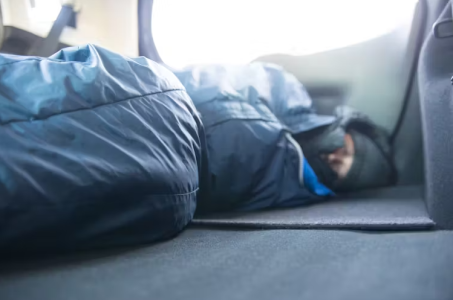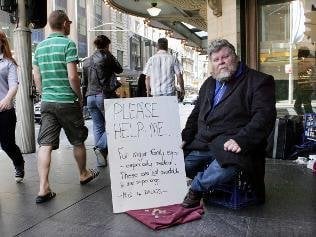Labor has promised to tackle homelessness. Here’s what homeless people say they need
- Replies 22
The 2025 election is over and now it’s time for Labor to deliver on campaign promises to address homelessness.
Action on homelessness is long overdue. Affordable housing options remain scarce and public and community housing waitlists keep growing.
The crisis springs from decades of government policy failures in many areas. Homelessness is linked to poverty, stigma, violence and poor health.
Labor has promised to:
Our recent research involved speaking with 47 people with current or past experiences of homelessness in Victoria and South Australia. The study was co-designed and co-led by people who had experienced homelessness.
See us, hear us
Participants told us their perspectives aren’t valued. One said:
Another said:
Many wanted to influence policy and service design. One said:
Respect our expertise
People who’ve experienced homelessness can “identify things that someone without that lived experience may simply not have thought of in the first place”, one person told us.
They should be involved as staff and leaders in service design and provision. One person said:
One participant who’d experienced domestic violence said navigating all the different non-government agencies was complicated. Decisions were made without her input.
A failure to find this woman housing eventually led to her children being removed.
Respect needs to be at the centre of service provision. One participant described overhearing workers complaining about the smell of homeless people. Another said they’d value practical advice from people who’d experienced homelessness:
Valuing and paying for the expertise of people who have experienced homelessness is vital. One participant said:
Another said:
From prison to homelessness
Around half of those leaving prison exit into homelessness.
Many women in these circumstances must choose between homelessness and returning to violent situations.
Community organisations work hard to keep women housed, but this requires adequate and ongoing funding.
One formerly incarcerated woman told us:
Another said:
People with experience of homelessness are best placed to guide the design and delivery of services, and offer pragmatic solutions.
One participant told us:
People told us a one-size-fits-all, box-ticking approach won’t work because:
Another said:
Many services aren’t working for homeless people. One participant said:
What now?
Our research participants called for policy addressing poverty and for the perspectives of people who’d experienced homelessness to be:
This article is republished from The Conversation under a Creative Commons license. Read the original article.
Action on homelessness is long overdue. Affordable housing options remain scarce and public and community housing waitlists keep growing.
The crisis springs from decades of government policy failures in many areas. Homelessness is linked to poverty, stigma, violence and poor health.
Labor has promised to:
- build more affordable housing
- reduce social housing waitlists
- prioritise groups vulnerable to homelessness
- invest A$1.2 billion in homelessness accommodation.
Our recent research involved speaking with 47 people with current or past experiences of homelessness in Victoria and South Australia. The study was co-designed and co-led by people who had experienced homelessness.
See us, hear us
Participants told us their perspectives aren’t valued. One said:
Homeless people [are] looked down upon. The individual is not considered. They fall on hard times for many reasons. They will judge you and they’ll categorise you.
Another said:
Do we have a voice? No, we don’t, because they don’t care […] they don’t listen.
Many wanted to influence policy and service design. One said:
I think it’s really important that people like us […] have a say in the way we move forward, and it’s not coming from people in really nice suits […] that don’t really have any experience.
Respect our expertise
People who’ve experienced homelessness can “identify things that someone without that lived experience may simply not have thought of in the first place”, one person told us.
They should be involved as staff and leaders in service design and provision. One person said:
I think if there were people that were around with lived experience that could somehow get in contact with people like me at that time and say, “Look, mate, you don’t have to go down this path, you don’t have to live this kind of life, there’s another way”.
One participant who’d experienced domestic violence said navigating all the different non-government agencies was complicated. Decisions were made without her input.
A failure to find this woman housing eventually led to her children being removed.
Respect needs to be at the centre of service provision. One participant described overhearing workers complaining about the smell of homeless people. Another said they’d value practical advice from people who’d experienced homelessness:
Having someone who’s actually been through that and can actually then describe what navigating systems means to someone coming in could be a really useful way to employ someone in homelessness services.
Valuing and paying for the expertise of people who have experienced homelessness is vital. One participant said:
I was on a panel with CEOs of homelessness organisations [and] was asked one hour before: “Would you like to be the lived experience voice?” So, was I paid the same? No. Was I given the same respect as everyone else? No. Was I given enough time to prepare? No. But did I deliver? Yes, I delivered. I showed up and I still was able to deliver. So, I think my expertise […] is just as valid as anybody else’s.
Another said:
You need to get as wide a lived experience as possible, otherwise it’s a bit pointless if they’re all 30-year-old white guys.
From prison to homelessness
Around half of those leaving prison exit into homelessness.
Many women in these circumstances must choose between homelessness and returning to violent situations.
Community organisations work hard to keep women housed, but this requires adequate and ongoing funding.
One formerly incarcerated woman told us:
Incarceration creates homelessness […] they’re released into a void […] If that was me, I would definitely rather be in prison than be on the street.
Another said:
Most women who are in prison suffered from childhood sexual abuse, they’ve suffered domestic violence and suffered a lot of trauma […] but for some reason, that’s all forgotten for us when we’re released.
People with experience of homelessness are best placed to guide the design and delivery of services, and offer pragmatic solutions.
One participant told us:
When I came out [of hospital], one of the community service people said, “Oh, we can put you in a hotel for four nights.” And I said, “Actually, the best thing I need is four new tyres on my van.” And they said, “No, we can’t do that.” The tyres would be cheaper than the hotel. But they said, “No, we can’t.” I’ve always said solutions don’t have to be pretty, but they have to work.
People told us a one-size-fits-all, box-ticking approach won’t work because:
not everybody fits into those categories. Everybody [is] in different circumstances.
Another said:
You go to a service, they don’t care about your purpose. They don’t care about your goal. They care about: “Have I provided my service that I’m obligated to give?”
Many services aren’t working for homeless people. One participant said:
One of the reasons I stayed homeless is because I either had to kill my dog or give my dog up and I couldn’t do either because he was my saviour. So, I lived in that car. At that time, I was freezing and gave whatever blankets I could to my dog. He got so sick […] I contacted another place [and] asked for a sleeping bag and a tent to be sent to me and it was sent to the service provider that never gave it to me.
What now?
Our research participants called for policy addressing poverty and for the perspectives of people who’d experienced homelessness to be:
- embedded in housing and homelessness policy, service design and practice
- recognised, valued and properly remunerated
- involved in leading research.
This article is republished from The Conversation under a Creative Commons license. Read the original article.











